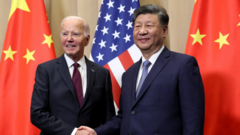In his remarks, Xi outlined that "a new Cold War should not be fought and cannot be won," indicating China's stance against perceived containment strategies from the US. He characterized a stable relationship as essential not just for the two nations but for global stability. He expressed hope that the US and China would avoid the pitfalls of mutual hostility, as tensions have surged during Biden's administration, marked by trade disputes and issues relating to Taiwan.
Biden acknowledged the competitive nature of the US-China dynamic, arguing that it must not lead to military conflict. Regardless, analysts warn that relations might deteriorate given Trump's focus on protectionist tariffs and critical stance towards China.
Xi and Biden reflected on attempts made under Biden's presidency to ease tensions, though challenges remain, especially with Trump's planned aggressive trade policies and appointments of hardliners. Both leaders noted previous dialogues on sensitive topics like trade and military actions, but the future landscape is marked with uncertainty.
Observers indicate that China is apprehensive about Trump's unpredictability and his commitment to raising tariffs significantly. They also worry about potential impacts on bilateral negotiations and the feasibility of influence in a new US administration. As relations pivot, both sides grapple with a delicate balance of cooperation and competition moving forward.
Biden acknowledged the competitive nature of the US-China dynamic, arguing that it must not lead to military conflict. Regardless, analysts warn that relations might deteriorate given Trump's focus on protectionist tariffs and critical stance towards China.
Xi and Biden reflected on attempts made under Biden's presidency to ease tensions, though challenges remain, especially with Trump's planned aggressive trade policies and appointments of hardliners. Both leaders noted previous dialogues on sensitive topics like trade and military actions, but the future landscape is marked with uncertainty.
Observers indicate that China is apprehensive about Trump's unpredictability and his commitment to raising tariffs significantly. They also worry about potential impacts on bilateral negotiations and the feasibility of influence in a new US administration. As relations pivot, both sides grapple with a delicate balance of cooperation and competition moving forward.

















